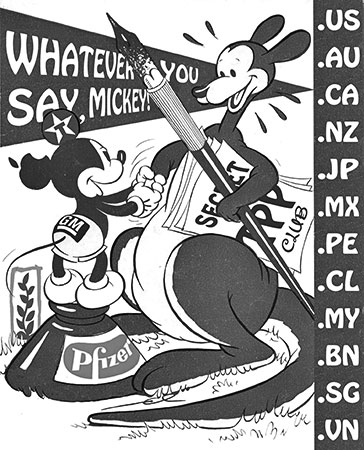|
November 13, 2013 from WikiLeaks Website
The TPP is the largest-ever economic treaty, encompassing nations representing more than 40 per cent of the world’s GDP. The WikiLeaks release of the text comes ahead of the decisive TPP Chief Negotiators summit in Salt Lake City, Utah, on 19-24 November 2013.
The chapter published by WikiLeaks is perhaps the most controversial chapter of the TPP due to its wide-ranging effects on,
Significantly, the released text includes the negotiation positions
and disagreements between all 12 prospective member states.
Members of the US Congress are only able to view selected portions of treaty-related documents in highly restrictive conditions and under strict supervision.
It has been previously revealed that only three individuals in each TPP nation have access to the full text of the agreement, while 600 ’trade advisers’, lobbyists guarding the interests of large US corporations such as,
...are granted privileged access to crucial sections of the treaty text.
The
Obama
administration is preparing to fast-track the TPP treaty in a
manner that will prevent the US Congress from discussing or amending any
parts of the treaty. Numerous TPP heads of state and senior government
figures, including President Obama, have declared their intention to sign
and ratify the TPP before the end of 2013.
The advanced draft of the Intellectual Property
Rights Chapter, published by WikiLeaks on 13 November 2013, provides the
public with the fullest opportunity so far to familiarise themselves with
the details and implications of the TPP.
The Chapter’s subsections include agreements
relating to patents (who may produce goods or drugs), copyright (who may
transmit information), trademarks (who may describe information or goods as
authentic) and industrial design.
Particular measures proposed include supranational litigation tribunals to which sovereign national courts are expected to defer, but which have no human rights safeguards. The TPP IP Chapter states that these courts can conduct hearings with secret evidence.
The IP Chapter also replicates many of the
surveillance and enforcement provisions from the shelved SOPA and ACTA
treaties.
Julian Assange emphasizes that a “cringingly obsequious” Australia is the nation most likely to support the hardline position of US negotiators against other countries, while states including Vietnam, Chile and Malaysia are more likely to be in opposition.
Numerous key Pacific Rim and nearby nations, including,
... have not been involved in the drafting of
the treaty.
Current TPP negotiation member states are,
Read the full secret TPP treaty IP chapter
'Secret
TPP Treaty - Advanced Intellectual Property Chapter for All 12 Nations with
Negotiating Positions.'
'Derechos' de Propiedad Intelectual
13 Noviembre 2013 del Sitio Web WikiLeaks
El TPP es el tratado económico más grande de todos los tiempos, abarcando naciones que representan más del 40 por ciento del PIB del mundo. La publicación de WikiLeaks del texto se ha realizado antes de la cumbre decisiva de Negociadores en Jefe del TPP en Salt Lake City, Utah, del 19 al 24 de noviembre del 2013.
El capítulo publicado por WikiLeaks es posiblemente el de mayor controversia del TPP debido a sus efectos de largo alcance sobre,
Significativamente, el texto publicado incluye las
posiciones de negociación y desacuerdos entre los 12 estados miembros
prospectivos.
Juntos,
el TPP y el TTIP abarcarán más del 60 por ciento del PIB global. Ambos
pactos excluyen a China.
Los miembros del congreso de EE.UU. únicamente pueden ver porciones selectas de documentos relacionados al tratado bajo condiciones altamente restrictivas y bajo supervisión estricta.
Se ha revelado anteriormente que solo tres individuos de cada nación TPP tienen acceso al texto completo del acuerdo, mientras que a 600 'asesores de comercio', cabildeadores protegiendo los intereses de corporaciones estadounidenses tales como,
...se les
concede acceso privilegiado a secciones cruciales del texto del tratado.
Numerosos jefes de estado de países TPP y
altos funcionarios de gobierno, incluyendo al Presidente Obama, han
declarado su intención de firmar y ratificar el TPP antes del final del
2013.
El borrador avanzado del Capítulo de
Derechos de Propiedad Intelectual publicado por WikiLeaks el 13 de noviembre
del 2013, entrega al público la máxima oportunidad hasta el momento para
familiarizarse con los detalles y las implicaciones del TPP.
Los
subapartados del Capítulo incluyen acuerdos relacionados a patentes (quién
puede producir bienes o medicamentos), derechos de autor (quién puede
transmitir información), registros de marca (quién puede describir
información o bienes como auténticos) y diseño industrial.
Medidas particulares propuestas incluyen tribunales de litigio supranacionales ante los cuales los juzgados soberanos nacionales deberán tener deferencia, pero no tendrán salvaguardias para los derechos humanos. El Capítulo de PI del TPP declara que estos juzgados podrán llevar a cabo audiencias con evidencia secreta.
El Capítulo de PI también reproduce muchas
de las disposiciones sobre vigilancia y cumplimiento de los tratados
archivados de SOPA y ACTA.
Julian Assange enfatiza que una Australia “agachadamente servil” es la nación que más probablemente apoye la posición de línea dura de los negociadores de EE.UU. contra otros países, mientras que es más probable que estados incluyendo a Vietnam, Chile y Malasia se encuentren en oposición.
Numerosas naciones clave de la Cuenca del Pacífico así como naciones cercanas, incluyendo,
...no han estado involucradas en la elaboración del tratado.
Los estados miembros actuales en la negociación del TPP son,
Lea el Capítulo de PI del tratado secreto TPP 'Secret TPP Treaty - Advanced Intellectual Property Chapter for All 12 Nations with Negotiating Positions'.
|

